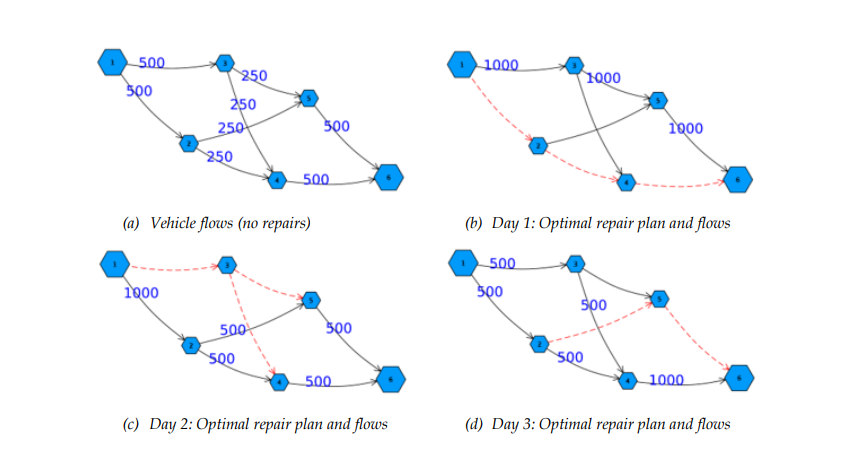Optimal Roadworks Schedule in Multi-Agent Transportation Models

Figure: Vehicle flows between nodes 1 and 6 for on different days before the optimal repair plan is started
Summary
In this paper we consider the problem of the optimal roadworks scheduling in the road traffic network optimization. The main goal of this research is to find the optimal order of roadworks and minimize their negative impact on the transportation network throughput.
In order to model the dynamics of a transportation system, we propose a large-scale, multi-agent vehicle routing modelling framework for traffic simulation and impact of roadworks on traffic throughput.
We present a quick and effective heuristic algorithm for streamlining the road repairs. Finally, the numeric experiment in a real-world setting is conducted. The obtained results indicate the flexibility of the proposed algorithm, which can be effectively applied by decision makers who need to carry out roadworks with limited time and resources.
2023 Journal Impact Factor: 2.1
Publication date: November 2024
Links
References
| APA | Opalski, M., Szufel, P., Kamiński, B., Mashatan, A., & Pralat, P. (2024). Optimal Roadworks Schedule in Multi-Agent Transportation Models. European Journal of Transport and Infrastructure Research, 24(4), 41–61. |
|---|---|
| BibTeX | @article{opalski2024optimal, title={Optimal Roadworks Schedule in Multi-Agent Transportation Models}, author={Opalski, Marcin and Szufel, Przemys{\l}aw and Kami{\'n}ski, Bogumi{\l} and Mashatan, Atefeh and Pralat, Pawel}, journal={European Journal of Transport and Infrastructure Research}, volume={24}, number={4}, pages={41--61}, year={2024} } |
| DOI | https://doi.org/10.59490/ejtir.2024.24.4.6984 |
| IEEE | M. Opalski, P. Szufel, B. Kamiński, A. Mashatan, and P. Pralat, “Optimal Roadworks Schedule in Multi-Agent Transportation Models,” European Journal of Transport and Infrastructure Research, vol. 24, no. 4, pp. 41-61, Nov. 2024. |
| ISSN | 1567-7133 |
Acknowledgement
This research was funded, in part, through a generous contribution from NXM Labs Inc (external link, opens in new window) as well as the grants from Fields Centre for Quantitative Analysis and Modelling (Fields-CQAM) (external link, opens in new window) and Natural Sciences and Engineering Research Council of Canada (NSERC) Collaborative Research and Development (CRD) (external link, opens in new window) program.
